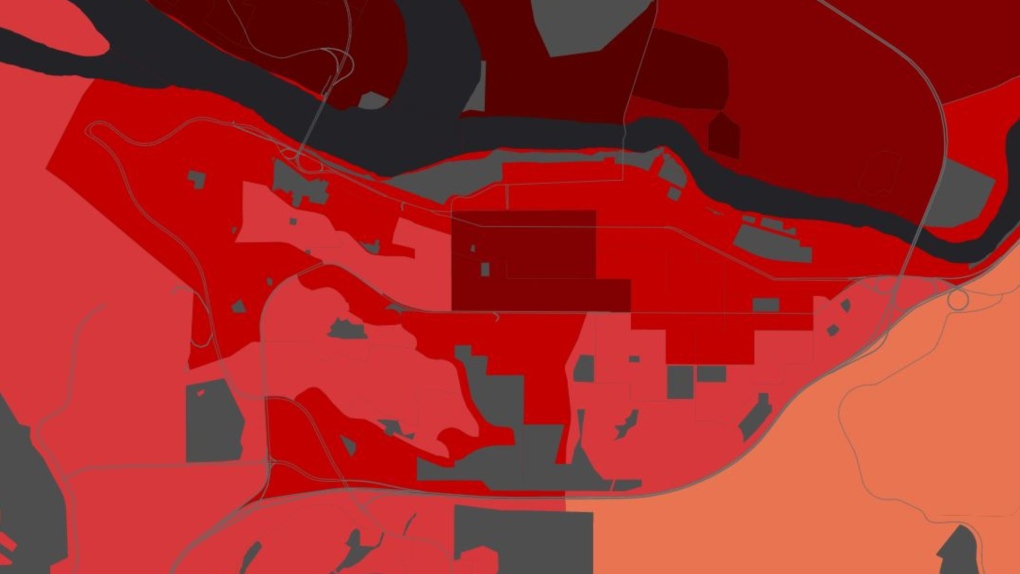Interactive maps show B.C. communities' vulnerability to climate hazards like flooding, wildfire smoke
 Heat vulnerability map for Kamloops, B.C. (Interior Health)
Heat vulnerability map for Kamloops, B.C. (Interior Health)
A B.C. health authority has released a series of maps showing how vulnerable its communities are to climate-related hazards like extreme temperatures, flooding and smoke.
Interior Health shared its recently developed community health and climate change maps Friday. The maps, made in partnership with the University of British Columbia, aim to help governments, local agencies and residents understand climate-sensitive areas and plan their infrastructure or emergency responses in the future.
"As in the rest of the province, Interior Health and the communities we serve in this region are being significantly impacted by climate change," Dr. Sue Pollock, interim chief medical health officer with Interior Health, told CTV News Vancouver.
"They're really meant as another tool in our toolbox for really understanding who is most impacted by climate-related events and to allow focus on vulnerable groups within our communities who will be most impacted."
Each map shows a region's risk to high temperatures, low temperatures, flooding and wildfire smoke. That vulnerability is measured by considering exposure, sensitivity and adaptive capacity.
Some of the factors used to determine a community's sensitivity are the age of the population and their pre-existing health conditions, Interior Health explained, because they impact individual health and physical impacts during extreme events.
Meanwhile, adaptive capacity is determined by several factors like income, social status, education, physical environments and social supports.
Darker shades are used on the maps to indicate a higher risk or vulnerability.
"It's really important to provide information to communities about where they're most vulnerable in terms of these hazards," Pollock said.
Pollock said along with helping communities prepare, the maps can raise awareness of how climate change impacts different people and communities.
"We know some people are more vulnerable to climate change than others," she said.
"All of these hazards, the extreme events, lead to illness and in some cases can lead to death and there are many indirect impacts as well from these hazards."
Interior Health's regional maps can be seen here.
Vancouver Coastal Health and Fraser Health's maps, which were updated last year, can be seen here.
CTVNews.ca Top Stories

Ministers Joly, LeBlanc travel to Florida to meet with Trump's team
Two members of Prime Minister Justin Trudeau's cabinet will be in Palm Beach, Fla., Friday to meet with members of Donald Trump's team.
India alleges widespread trafficking of international students through Canada to U.S.
Indian law enforcement agencies say they are investigating alleged links between dozens of colleges in Canada and two 'entities' in Mumbai accused of illegally ferrying students across the Canada-United States border.
Teen actor Hudson Meek, who appeared in 'Baby Driver,' dies after falling from moving vehicle
Hudson Meek, the 16-year-old actor who appeared in 'Baby Driver,' died last week after falling from a moving vehicle in Vestavia Hills, Alabama, according to CNN affiliate WVTM.
Aviation experts say Russia's air defence fire likely caused Azerbaijan plane crash as nation mourns
Aviation experts said Thursday that Russian air defence fire was likely responsible for the Azerbaijani plane crash the day before that killed 38 people and left all 29 survivors injured.
Police identify victim of Christmas Day homicide in Hintonburg, charge suspect
The Ottawa Police Service says the victim who had been killed on Christmas Day in Hintonburg has been identified.
Pizza deliverer in Florida charged with stabbing pregnant woman at motel after tip dispute
A pizza deliverer in central Florida has been charged with pushing her way into a motel room with an accomplice and stabbing a pregnant woman after a dispute over a tip, authorities said.
Unwanted gift card in your stocking? Don't let it go to waste
Gift cards can be a quick and easy present for those who don't know what to buy and offer the recipient a chance to pick out something nice for themselves, but sometimes they can still miss the mark.
Cat food that caused bird-flu death of Oregon pet was distributed in B.C.: officials
Pet food contaminated with bird flu – which killed a house cat in Oregon – was distributed and sold in British Columbia, according to officials south of the border.
Raised in Sask. after his family fled Hungary, this man spent decades spying on communists for the RCMP
As a Communist Party member in Calgary in the early 1940s, Frank Hadesbeck performed clerical work at the party office, printed leaflets and sold books.
































